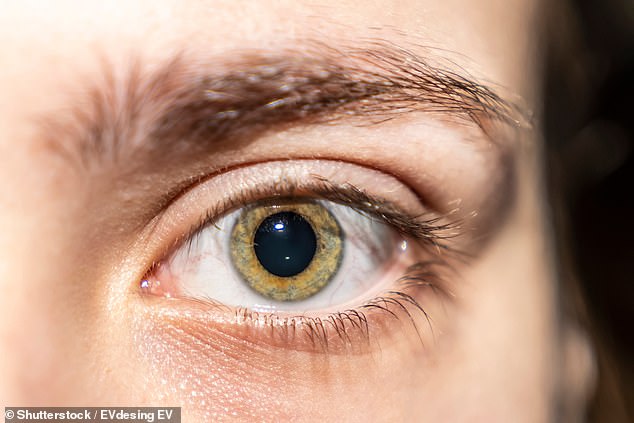Share this @internewscast.com
Blurry vision and seeing spots could means you’re at high risk of developing early-onset dementia, researchers have discovered.
Researchers from New Zealand discovered that individuals are significantly more likely to receive a diagnosis of the disease in their 60s, 50s, and even 40s if the light-sensitive tissue at the back of the eye is unusually thin.
This condition, identified medically as retinal thinning, leads to distorted vision. Symptoms include seeing spots, lines, or flashing lights, and experiencing alterations in color perception.
The risk of dementia also increased in those exhibiting signs of artery narrowing and vein widening in the eye, which can lead to pain or pressure and potential vision loss in one eye.
The researchers, from the University of Otago, suggested that both problems suggest insufficient blood flow to both the eye and the brain, which could contribute to the development of the memory robbing condition.
They added that it could also be a sign of poor circulation throughout the body, which is also a known risk factor for the disease, as well as heart attack and stroke.
Thorough eye examinations could therefore be a useful method of targetting those at risk of developing the disease, according to study author and psychology researcher Dr Ashleigh Barrett-Young.
Early diagnosis is considered critical for better outcomes as dementia treatments can combat symptoms and slow down progression.

The the obscure clue in your eye that could reveal you will get dementia as young as 45-years-old all comes down to your blood vessel health and the thickness of your retina, researches from New Zealand have said
For the study, experts analysed data from participants of the Dunedin Multidisciplinary Health and Development Study, which recorded 45 years of health data from 900 New Zealanders with an average age of 45-years-old.
They combined photos and scans of participants’ retinas with cognitive tests designed to predict a person’s risk of the disease.
Assessments were carried out at birth and ages three, five, seven, nine, 11, 13, 15, 18, 21, 26, 32, 38, and most recently at age 45.
Results showed those with retinal thinning and poor eye blood vessel health were far more likely to show signs of cognitive decline aged 45 — often a precursor to dementia.
The researchers advised that the imaging could be a simple and low-cost method of assessing dementia risk among middle-aged adults.
However they warned the test could only show potential risk and is not a definitive diagnosis.

Alzheimer’s disease is the most common cause of dementia. The disease can cause memory problems, thinking and reasoning difficulties and language problems are common early symptoms of the condition, which then worsen over time

Around 900,000 Britons are currently thought to have the memory-robbing disorder. The researchers advised that the imaging could be a simple and low-cost method of assessing Alzheimer’s disease and related dementias among middle-aged adults
The size of your temporalis muscle, which helps to open and close your jaw, has also been linked to dementia risk.
If the muscle is smaller, it can serve as an indicator of overall muscle loss, a condition known as sarcopenia, which is often associated with the devastating diagnosis.
It’s estimated that around 7.5 per cent of the 944,000 Britons with the disease have young-onset dementia, where symptoms occur younger than 65.
Alzheimer’s is the most common form of dementia in younger people, accounting for around a third, in comparison to about 60 per cent in those over 65.
Memory problems, thinking and reasoning difficulties and language problems are common early symptoms of the condition, which then worsen over time.











